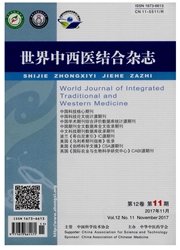

 中文摘要:
中文摘要:
金元四大家之一的朱丹溪主张内伤致病理论,其主要学术观点"六郁"学说为内科杂病的认识与辨治做出了重要的贡献。仝小林教授总结临床经验,将丹溪的因郁致病学说充分阐发并应用于胃肠疑难病的辨治中,取得了良好的疗效。从郁论治胃肠病,抓住辨证要点是关键,火郁以热郁于内而体温不高为辨证要点,用"三升阳方"(升阳散火汤、升阳益胃汤、补中益气汤);寒郁常以呕吐清水唾沫为辨证要点,实寒治用吴茱萸汤,虚寒治用四君子汤;食郁以嗳气打嗝为辨证要点,治以保和丸;表郁以肌表热像、上吐下泻为辨证要点,治以藿香正气散;湿、痰、瘀则是诸郁的继发性因素,亦是论治胃肠疾病的重要切入点,临证时应通过舌象及舌下络脉区分病邪的性质以及病情的发展程度。
 英文摘要:
英文摘要:
Zhu Danxi,one of the four masters in the Jin and Yuan Dynasties,proposes the theory as"disorder resulting from internal injury". His main academic thought,"six stagnations"contributes greatly to the recognition and differentiation of miscellaneous disease of internal medicine. Prof. Tong Xiaolin' s experiences have adequately explained Zhu Danxi's theory as"disorder resulting from internal injury"and applied it to the differentiation and treatment of gastrointestinal difficult diseases. The satisfactory therapeutic results have been achieved. The differentiation of syndrome is very important in terms of "stagnation"theory in the treatment of gastrointestinal disorders. Fire stagnation is manifested as heat accumulation inside body and low fever and the formulas for raising yang are applicable( the formulas for lifting yang and dispersing fire,for lifting yang for benefiting stomach and for tonifying qi in the middle jiao). Cold stagnation is manifested as vomiting with clear saliva and wuzhuyu tang is suitable for cold of excess type and sijunzi tang for cold of deficiency type. Food stagnation is manifested as belching and hiccups and baohe pill is applicable. The stagnation in the exterior is manifested as heat signs on the body surface,vomiting and diarrhea and huoxiang zhengqi powder is applicable. Damp,phlegm and stasis are the secondary factors of all of stagnations and are the keys in the treatment of gastrointestinal disorders. In clinical treatment,the tongue diagnosis and the conditions of sublingual veins should be considered to determine the nature of pathogens and progression of disorders.
 同期刊论文项目
同期刊论文项目
 同项目期刊论文
同项目期刊论文
 期刊信息
期刊信息
